|
Council 2009 wraps up with key decisions on global issues
and a balanced budget for ITU for 2010-2011
The Council concluded its work on Friday, 30 October having considered 87
documents, including 22 contributions from Member States, and having taken key
decisions on such pressing, global issues as climate change and protecting children online
(see Highlights of 29 October). It
also adopted a resolution on the role of the Dedicated Group on
international Internet-related public policy issues, a recommendation on
promoting the use of Internet protocol version 6 (IPv6), a new ITU
standards conformity and interoperability
programme to boost market
confidence in ICT products and,
finally, the biennial budget for 2010-2011. It was
attended by 301 participants, representing 46 Member States of Council, 36
Member State Observers, and 9 Sector Member Observers.
Council endorses the report of the Chairman of the Standing Committee on Administration and Management
On its final day, the Council considered and approved the
report of the Chairman of the Standing Committee on
Administration and Management. Presenting the report, the
Committee’s Chairman González Bustamante from Mexico said that
the Committee held eight meetings. During this time, the Committee considered 28
documents. This issue of the Highlights is an abridged version
of that report and looks at some of the conclusions reached in
the Committee and approved by the Council.
In his closing remarks, ITU Secretary-General, Hamadoun I. Touré said
“We were honoured to have with us for this Council several ministers,
deputy ministers, and ambassadors. We were even more honoured to have as
our Chairman, the distinguished Minister of Communications from Ghana,
His Excellency Mr Haruna Iddrisu”.
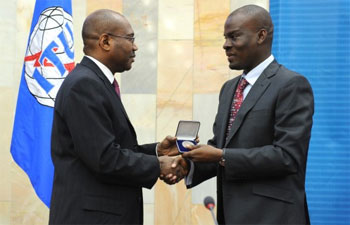 Chairman
awarded the ITU Silver Medal and certificate Chairman
awarded the ITU Silver Medal and certificate
"You have steered our discussions so smoothly and ably. Your ability to
summarize difficult debates and to guide us has been most impressive,”
Dr Touré stated.
This view was shared by all delegations who took the floor at the end of
the Council. Dr Touré presented the ITU Silver Medal and certificate to
Mr Iddrisu in recognition of his “outstanding leadership of the 2009
Session of the ITU Council”.
Going paperless... and climate change
In a year so marked by negotiations on the issue of climate change, Dr
Touré said: “This was our second test for the Council to work as far as
possible in a paperless environment. And I am delighted to see that for
a second time it worked again. Our figures indicate that we reduced
paper usage by 766 kilos. This equates to almost one and a half tonnes
of greenhouse gas emissions we saved – equivalent to driving a typical
family vehicle in the United States for almost four months. And working
electronically has again allowed the secretariat to enhance time to
publication and provide quick access of documents and reports to
councillors.”
Dr Touré's speech
highlights the key decisions and the innovative working methods of the
Council and provides an outlook for 2010.
Budget approved for 2010-2011
The Council approved a budget of CHF 332 639 000 for the
2010-2011 biennium. This represents CHF 169 271 000 for the 2010 budget
year and CHF 163 368 000 for the 2011 budget year (see table below).
|
|
Thousands of Swiss francs
|
|
2010
|
2011
|
2010-2011
|
|
General Secretariat
|
93'255
|
88'089
|
181'344
|
|
Radiocommunication Sector
|
33'094
|
32'909
|
66'003
|
|
Telecommunication Standardization Sector
|
12'872
|
13'298
|
26'170
|
|
Telecommunication Development Sector
|
30'050
|
29'072
|
59'122
|
|
Total
|
169'271
|
163'368
|
332'639
|
The budget for 2010-2011 was presented to the
plenary on 21 October (see Issue No. 2 of the Highlights) before being
considered by the Standing Committee.
Just like in the plenary, delegates in the Standing Committee
expressed great appreciation for what they described as “a well detailed
and transparent budget document”. They recognized the considerable
amount of work that must have gone into preparing the budget. The
Committee also welcomed the zero nominal growth
approach in the amount of the contributory unit, especially given the
current global economic and financial environment.
As Dr Touré put it in his
closing
remarks: “We approved the biennial budget for 2010-2011 in record
time! I think this is due to the transparent manner in which the budget
was presented, and I thank you for your confidence.”
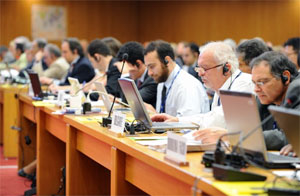 The Council also set the amount of the annual contributory
unit for 2010 and 2011 at CHF 318 000, based on the class of
contribution chosen by Member States. Compared with the situation on
which this budget is based, the total number of contributory units from
Member States has increased by 2 per cent, thanks to the Republic of
Korea doubling its contribution from 5 to 10 units, and to the Kingdom
of Bahrain, the Sultanate of Oman and the State of Qatar which changed
from ½ unit to one unit. The Council also set the amount of the annual contributory
unit for 2010 and 2011 at CHF 318 000, based on the class of
contribution chosen by Member States. Compared with the situation on
which this budget is based, the total number of contributory units from
Member States has increased by 2 per cent, thanks to the Republic of
Korea doubling its contribution from 5 to 10 units, and to the Kingdom
of Bahrain, the Sultanate of Oman and the State of Qatar which changed
from ½ unit to one unit.
For Sector Members, the annual value of the contributory unit for these
two years has been set at CHF 63 600. The contributions for Associates
have been set at CHF 10 600 for those participating in the work of the
Telecommunication Standardization Sector (ITU–T) and the
Radiocommunication Sector (ITU–R). In the Telecommunication Development
Sector (ITU–D), Associates will pay CHF 3975. Associates from developing
countries participating in the work of ITU-D will pay CHF 1987.50.
Some concerns were expressed with regard to the decline in the number of
Sector Members that could become critical if this trend continues.
All delegations who took the floor commended the Chairman of the
Standing Committee and the secretariat for a job well done.
Management and functioning of the Union
In its Resolution 147, the Plenipotentiary Conference (Antalya, 2006) instructed
the Council to conduct a study with the aim of improving the efficiency of ITU
management by addressing such issues as reporting structures; role,
accountability, number and tenure of elected officials; functioning of the
Coordination Committee; election procedures, and responsibility and
accountability of advisory groups.
The secretariat undertook consultations with Member States on these and other
issues through Circular Letter 143 and presented the results to the Council in
Document 44. Several Member States also submitted proposals on these matters in
Documents 69, 74, 75 and 76.
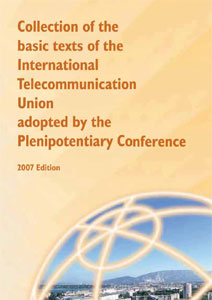 There was strong support for stabilizing the basic instruments of the Union
(notably, the Constitution) and for an in-depth review of all the revenue
sources for the Union; for example, the contributory unit system, membership
types and fees, document and other sales items, including those being sold on a
“cost-recovery” basis. There was strong support for stabilizing the basic instruments of the Union
(notably, the Constitution) and for an in-depth review of all the revenue
sources for the Union; for example, the contributory unit system, membership
types and fees, document and other sales items, including those being sold on a
“cost-recovery” basis.
Many delegations expressed the need for more consultations with all Member
States, advising them of the key challenges and questions to be resolved
and providing them with
references to relevant documents considered at Council 2009.
The Council has instructed that the Secretary-General continue consultations
with all Member States as a follow-up to Circular Letter 143. The issues to be
discussed in the new consultation will include:
- Terminology for the titles of the Directors of the Bureaux.
- A review of the relationship between the timing of the
Credentials Report and elections at Plenipotentiary Conferences.
- A review of the contributory unit system
for Member States.
- A review of existing and new revenue
sources and associated costs, including financial contributions from Sector
Members and Associates.
- Methods to stabilize the basic instruments
of the Union, and, in particular, the Constitution, on the understanding that
this should focus on existing text and should not include new issues.
The Secretary-General will report to Council 2010 on these matters, along with a
proposed time plan with specific action items to be considered.
Statement by the Staff Council
Ms Maite Comas Barnés, Vice-President of the Staff Council, made a
statement
in accordance with Resolution 51 (Rev. Minneapolis, 1998) of the
Plenipotentiary Conference.
Some concern was voiced over the present relations between the Staff Council and
the Administration. A number of delegations made positive suggestions
towards improving the situation. They called on both parties to work
towards improving communications and acknowledged the willingness on both sides
to begin work on rebuilding trust and dialogue.
Tripartite Group on Human Resources Management
Since Council 2008, the Tripartite Group on Human Resources Management has held
two meetings with a focus on three major issues:
- the establishment of an ITU ethics policy containing two main
components: “whistle blowing” provisions and financial disclosure;
- the implementation of the new contractual arrangements approved
by the 2008 session of the Council;
- the establishment of a Strategic Plan on human resources
management. The Tripartite Group on Human Resources.
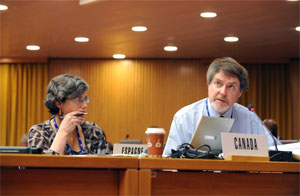 The Tripartite Group on Human Resources Management is chaired by
Bruce Gracie from Canada. When presenting the group’s report (Document
25) to the Standing Committee, Mr Gracie acknowledged the conflict which
now exists between the ITU management and the Staff Council. Reference
was made to Council Decision 517 on the strengthening of the dialogue
between the Management and the Staff Council. Mr Gracie offered to amend
this Council Decision in his capacity as Chairman of the Tripartite
Group– an offer that had been accepted by the Standing Committee.
The revision is expected to serve as a basis for reinstating a good and
constructive relationship between the Management and the Staff Council. The Tripartite Group on Human Resources Management is chaired by
Bruce Gracie from Canada. When presenting the group’s report (Document
25) to the Standing Committee, Mr Gracie acknowledged the conflict which
now exists between the ITU management and the Staff Council. Reference
was made to Council Decision 517 on the strengthening of the dialogue
between the Management and the Staff Council. Mr Gracie offered to amend
this Council Decision in his capacity as Chairman of the Tripartite
Group– an offer that had been accepted by the Standing Committee.
The revision is expected to serve as a basis for reinstating a good and
constructive relationship between the Management and the Staff Council.
Discussions also took place in the Standing Committee regarding the
implementation of the new contractual arrangements. One delegation
had suggested that the wording “acceptable performance" used in para.
2.1 (of Document 25) as a condition of the conversion of fixed-term
appointments into a continuing one be substituted by "satisfactory
performance", which corresponds to the language used in the UN common
system.
In addition, upon request of the United States delegation, it was
decided to ask that the Secretary-General ensure that the conditions for
the implementation of the new contractual arrangements are in line with
the framework established by the International Civil Service Commission
(ICSC) in its 2005 report. Reference was made in particular to the
fact that the ICSC recommended that "Appointment to a continuing
contract is acquired through open and transparent selection procedures
in accordance with the organization’s staff regulations and rules".
Noting these remarks during the Standing Committee, the Chief of the
Administration and Finance Department acknowledged that the intent of
those interventions was to ensure that the process of conversion to
continuing appointment should not be merely an administrative one.
As a result, ITU should implement a level of oversight, such as a review
of staff performance and any recommendations from Directors being
submitted to the Coordination Committee for final approval before
conversion.
The Council noted the Report of the Chairman of the Tripartite Group on
Human Resources Management and approved the revision of Decision 517
“Strengthening Dialogue between the ITU Administration and the ITU Staff
Council” (see Annex D to Document 104).
The Council also adopted the proposal to ensure a level of management
oversight to the process of conversion of staff from fixed-term status
to continuing status.
Towards a more complete ITU policy on ethics
The post of an ethics officer, reporting to the Secretary-General, is to be
established during the 2010-2011 biennium. Document 43 provides the background
on this proposal from the secretariat, along with a framework for policies in
the areas of financial disclosure and protection of staff from retaliation
(whistle blowing).
During the discussion in the Standing Committee, there was strong support for
the creation of this post, but also some concern about integrating the ethics
function into existing ITU policies. The responsibilities of the post are
expected to grow and evolve over time. And to be successful, there will have to
be “protections” for the ethics officer, as well, the Committee noted.
In the Committee, several delegations raised concerns regarding the policy on
financial disclosure. These included the scope of the policy regarding types of
financial disclosure. Delegates also stated that they preferred such policies to follow
standard United Nations practice.
The issue of whistle blowing legislation also received comments from many
delegations. Several requests were made for additional text and/or improvements
to existing text including:
- The need to make the language more positive.
- The need to reflect more strongly the concept of good faith.
- A review of the time limitation of reporting.
- Legal issues such as jurisdiction and self-incrimination.
- Protection to the organization against frivolous claims.
- The need to harmonize this policy with the UN.
- The need to clarify penalties, if any, associated with
misconduct.
The Council approved the position of ethics officer, along with the
basic principles contained in the two proposed policies. Revisions to
these policies will be submitted to Council 2010 through the Tripartite
Group. Once adopted, these policies will not be applied retroactively.
Human Resources Strategic Plan
During the Standing Committee, delegates were informed that when preparing
Document 56 (+Corr.1), ITU had consulted and reviewed other UN agencies’ human
resources strategies and best practice, documents and relevant references of
the International Civil Service Commission and the HR-Network, as well as
strategies from public and private enterprises.
This document will be accompanied by a detailed implementation plan, along with
performance indicators. In addition, the secretariat will submit to the Council,
every year, a status report on the Human Resources strategy action plan,
highlighting the progress made and the next steps.
Expressing appreciation for the secretariat’s document, the Standing Committee
had described it as a “living” and extremely important document and as a very
“ambitious” and “positive” start for the future of the ITU workforce.
Nevertheless, some delegations expressed concern over the fact that the Staff
Council had not been involved in the drafting of the strategy. These delegations
suggested postponing the endorsement of the document to the next Council session
in April 2010 so that more details regarding costs and any other financial
implications can be provided. Another delegation emphasized the importance of
linking the Human Resources Strategy to the ITU strategic plan, to operational
plans and to the biennial budget.
The Standing Committee:
- Pointed to the importance of strengthening dialogue
between the management and the Staff Council during the
implementation phase of the Human Resources Strategy.
- Expressed its appreciation regarding the suggested
policies towards reaching equitable gender and geographical
distribution, and urged the secretariat to try to reach better
results in these two areas.
- Showed particular interest on issues such as the “Young
Professional Programme, internship, succession planning, higher
standard of recruitment, and staff training and development”.
- Made comments regarding the “Separation policy – whether
voluntary or agreed upon –”, especially with regard to the policy’s
financial implications.
Having noted these comments, the Council endorsed the Human Resources
Strategic Plan as the foundation of a comprehensive framework for
action.
Human resources development and management
Document 60 was presented to the Standing Committee and responds to Resolution
48 (rev. Antalya, 2006). The document covers a wide range of staff and
management related issues, including recruitment, staffing, post classification,
training, performance evaluation, conditions of employment and staff-benefits.
It also outlines the action of the Administration and Finance Department, and in
particular the two Human Resources Divisions towards improving and modernizing
ITU policies and procedures in human resources management.
The Standing
Committee expressed its high appreciation for this document and its
content, but made remarks regarding gender balance and geographical
distribution. It urged the secretariat to consider implementing a more
active and affirmative action towards reaching better results in these
two areas, making reference also to the various proposals outlined in
Document 56 in this regard. Special emphasis was placed on
establishing new recruitment strategies that could help increase the
diversity of the workforce and help redress the gender and geographical
imbalance.
With reference to staff morale, a general survey is under preparation
and would be launched soon. The objectives of the survey are twofold:
to assess as much as possible the staff morale and to invite all staff
of the Union to provide the administration with inputs and contributions
to the follow-up actions for the Human Resources Strategic Plan.
The Council noted the report of the Secretary-General.
Reorganization of the Administration and Finance Department
Document 67 provides the background on the proposal from the secretariat to
strengthen the Administration and Finance Department with the creation of a new
post at the D1 level. The document underlines that, given the operational needs
of the human resources functions within ITU, there is a clear need to create an
additional senior-level post in the area of human resources. In line with ITU
procedures, the creation of the post was submitted to the Council for
approval, and Council was invited to note the job description for the
post.
The proposal was considered in the Standing Committee, which was advised that
the new post had been approved by the Coordination Committee and that provisions
had been included in the 2010-2011 budget to finance it. Several delegates noted
the need for such a post, but asked for further clarification on the history of
senior posts in the Administration and Finance areas and also on the need for
such a post so soon after the full reorganization of the Department.
The Council approved the creation of the post and noted the job description in
Document 67.
Reorganization of the Telecommunication Standardization Bureau
Document 32 on the reorganization of the
Telecommunication Standardization Bureau (TSB) was presented to the
Standing Committee on Thursday morning (29 October) by TSB Director
Malcolm Johnson. WTSA-08 had given TSB a lot of new work, in particular
for the high-level industry group, the IPv6 group, the conformance and
interoperability testing programme, and on accessibility and climate
change. Mr Johnson underlined the need to reorganize TSB in order to
cope with the additional workload (some 174 actions).
The main changes are the creation of a WTSA Programmes Division to implement
these actions, and the creation of a Policy and Technology Watch Division in
response to WTSA Resolution 66. These two Divisions, together with the existing
Workshop and Promotion Division, form a new Telecommunication Standardization
Policy Department, which will be headed by the Deputy to the Director of TSB.
The study group counsellors and assistants, together with the Operational
Bulletin and numbering team, form a new Study Group Department. This
Department would be headed by a staff member at D1 level, a position which
already existed in the TSB budget (but had been frozen). The post would now be
funded through the abolition of a P5 post. In total, 9 posts would be abolished
and 9 new posts created, increasing the number of P-level posts.
Many delegations took the floor, following Mr Johnson's presentation, and
praised the efforts and achievements of TSB and supported the reorganization.
These included the Russian Federation, the Republic of Korea, Saudi Arabia, the
United States, Canada, Mali, Burkina Faso, Bulgaria and Malaysia.
Mr Johnson responded to questions to confirm that the budgetary implications of
the reorganization were minimal and were foreseen in the 2010-2011 budget. The
number of TSB posts would remain at 63 and a succession plan of the numerous P5
posts of counsellors retiring in the next one to three years was being put in
place. The Republic of Korea commented that this would ensure a smooth
transition.
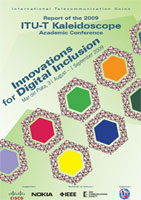 The United States pointed out that the Technology Watch Function was an
important part of the reorganization and stressed that contributions in this
area be driven by Member States. This view was shared by Canada. Mr Johnson
explained that TSB sought comments and input of researchers that it
got to know through the Kaleidoscope Event before publication of the final
version of the Technology Watch Reports. Malaysia welcomed the Kaleidoscope
initiative and Bulgaria, agreeing with these views, commented that TSB had made
a careful assessment of its needs and that the other two Bureaux and the General
Secretariat should carry out a similar exercise. The United States pointed out that the Technology Watch Function was an
important part of the reorganization and stressed that contributions in this
area be driven by Member States. This view was shared by Canada. Mr Johnson
explained that TSB sought comments and input of researchers that it
got to know through the Kaleidoscope Event before publication of the final
version of the Technology Watch Reports. Malaysia welcomed the Kaleidoscope
initiative and Bulgaria, agreeing with these views, commented that TSB had made
a careful assessment of its needs and that the other two Bureaux and the General
Secretariat should carry out a similar exercise.
The Council approved the reorganization of TSB and the job description of the D2
post of Deputy to the Director, Telecommunication Standardization Bureau and
Chief, Telecommunication Standardization Policy Department (see Annex E to
Document 104), along with the qualifications required for this post (see Annex F
to Document 104).
Strengthening the project execution function within ITU
Document 37 responds to Resolution 157 (PP-06) to strengthen the project
execution function in ITU and activities carried out since Council session of
2008. The document was considered by the Standing Committee and highlighted the
following key issues:
- Projects in the process of implementation and those pending
official closure:
- BDT is in the process of implementing over 80 projects
(estimated at around USD 71 million). At present, there are 93
projects that have been operationally completed, but not
officially closed (number reduced from 104 previously).
- retention of remaining undisbursed funds:
- Under its project closure efforts, BDT is in the process of
negotiating with project funding partners to retain the
remaining funds of projects which are operationally completed.
Subject to the confirmation of the projects’ funding partners,
BDT will use these remaining funds to implement ICT development
projects;
- retention of interests generated by the project’s budget.
BDT also presented activities highlighting lessons learned and best
practice in project management and resource mobilization as well as the
enhancement of its own staff in project management.
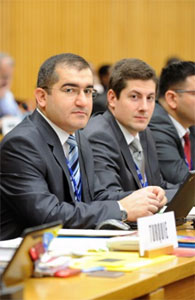 Turkey underlined that project execution is essential to ITU. In its
Document 87, the Turkish delegation proposed that the Council consider
introducing an interest retention policy in Annex 2 to Article 14 of the
Union’s Financial Regulations. Such a policy would require that unless
otherwise stipulated in the project document, interest should be
retained by ITU to help reduce a project’s costs or to fund other
projects. The Turkish proposal was welcomed and supported, in
particular, by the delegations of the Russian Federation, Cuba and
Bulgaria. Turkey underlined that project execution is essential to ITU. In its
Document 87, the Turkish delegation proposed that the Council consider
introducing an interest retention policy in Annex 2 to Article 14 of the
Union’s Financial Regulations. Such a policy would require that unless
otherwise stipulated in the project document, interest should be
retained by ITU to help reduce a project’s costs or to fund other
projects. The Turkish proposal was welcomed and supported, in
particular, by the delegations of the Russian Federation, Cuba and
Bulgaria.
The secretariat responded to questions from the United States, which
sought to know the reasons for the delay in closing projects and why
more human resources were requested, and from Malaysia regarding budget
implications.
Bulgaria explained that backlog of unclosed projects is typical within
the UN system, as administrations are slow to respond when asked what to
do with the remaining funds or interests.
The Council instructed the Secretary-General to take measures to close
all outstanding completed projects, as soon as possible.
An Audit Committee at ITU
As recommended by the Standing Committee, the Council approved, in principle,
the creation of an Audit Committee, subject to the need for Group FINREGS to
further analyse and discuss the issues raised by delegates and already included
in Document 18 (Rev.1). The final decision on
this matter will be taken at Council 2010 (see
also the
Highlights of 26
October).
Financial Operating Report for the Financial Year 2008
The Council approved the financial operating report, including the audited 2008
accounts for the TIES (Telecom Information Exchange Services) special account,
technical cooperation projects (United Nations Development Programme, trust
funds and Special Fund for Technical Cooperation), voluntary contributions and
the ITU Staff Superannuation and Benevolent Funds (see Resolution in Annex B of
Document 104).
Membership of the ITU Staff Pension Committee
The ITU Staff Pension Committee consists of three members of the Council, three
staff members appointed by the Secretary-General, and three participants chosen
by the staff. There are also three alternates designated for each staff
category. The Council appointed the representatives shown in the table below
to the ITU Staff Pension Committee.
|
Council representatives on the ITU Staff Pension Committee
|
|
|
|
Term of office |
|
Ms Johanne FOREST
(Canada)
|
Member |
Until the 2010 ordinary session of the Council
|
|
Mr Fabio
BIGI
(Italy) |
Member |
Until the 2011 ordinary session of the Council |
|
Mr Petko
KANTCHEV
(Bulgaria) |
Member |
Until the 2012 ordinary session of the Council
|
|
Mr Isaac Y. ANI
(Ghana) |
Alternate member |
Until the 2011 ordinary session of the Council
|
|
Mr
Victor M. MARTINEZ VANEGAS
(Mexico)
|
Alternate member |
Until the 2012 ordinary session of the Council |
|
Ms Vijayalakshmy K. GUPTA
(India)
|
Alternate member |
Until the 2012 ordinary session of the Council
|
Preparations for the World Conference on International Telecommunications
A new Resolution was approved creating a Council Working Group to Prepare for
the World Conference on International Communications in 2012 (CWG-WCIT12). The
group will be chaired by Professor Vladimir Minkin of the Russian Federation.
It will hold meetings in January and April 2010. It will submit a progress
report to the next session of the Council in April 2010 and a report to the
Plenipotentiary Conference in 2010.The Resolution also says that the group
will present its final report, well in advance of WCIT, for the use of
Member States in preparing their proposals to that conference. This
final report will be submitted to WCIT by the Secretary-General.
The Secretary-General and the Directors of the Bureaux will make
available to this group the means necessary to implement the provisions
of this Resolution, within the available financial resources of the
Union.
It invites the relevant study groups within the three Sectors, each
within its field of competence to carry out any further necessary
studies aimed at preparing for WCIT and to report to the group, as
appropriate. It invites Member States and Sector Members to contribute
to the work.
Terms of reference of CWG-WCIT12
The group is open to all Member States and Sector
Members and will work in the six official languages of
the Union. It will:
- Consider, as appropriate, relevant work regarding the International
Telecommunication Regulations (ITR) that
took place prior to the work of the Expert Group to review the ITRs.
- Take into account the work and the outputs of the Expert Group
to Review the ITRs and of the World Telecommunication Policy Forum
(Lisbon, 2009), with emphasis on Opinion 6.
- Study contributions and note information documents submitted to
it, including the contributions presented to Council 2009 and the
comments made during discussions at Council 2009.
- Discuss proposals for revisions to the existing ITRs, including
proposals for suppressions of provisions and/or abrogation as
appropriate.
- Discuss proposals relating to new and emerging issues.
- Reflect the results of all discussions, with possible reflection
of parties' positions in the minutes of the meetings, without taking
any decisions on those positions.
- Reconcile differences in approaches as contained in the inputs
to the extent possible, or, in the case where the approaches cannot
be reconciled, include the differing views and their justification.
- Prepare proposals to revise and/or abrogate as appropriate, the
WATTC-88 Resolutions, Recommendations and Opinions.
- Prepare proposals as appropriate for draft new
Resolutions, Recommendations and Opinions for consideration by WCIT.
A word of thanks
This issue of the Highlights concludes our coverage of Council 2009. Our
special thanks go to the Secretary-General Dr Hamadoun I. Touré and the
Deputy Secretary-General Houlin Zhao for their invaluable presentations;
to the Directors of the Bureaux Valery Timofeev (BR), Malcolm Johnson (TSB) and
Sami Al Basheer Al Morshid (BDT) for their input and comments; and to Doreen
Bogdan-Martin and Richard Barr for their contributions and their time in
reviewing the Highlights. We
also acknowledge the contributions (in alphabetical order) from Alassane
Ba, Elaine Baron,
Marie-Odile Beau, Emamgholi Behdad, Karim Boussaid, Raymond Chalindar,
Eric Dalhen, Luiz Fernando Ferreira da Silva, Yury Grin, Arnaud Guillot,
Richard Hill, Fabio Leite, Jean-Paul Lovato, Mario
Maniewicz, Alexander Ntoko, Tony Pitt, Idrissa Samake, Frank Sap, Reinhard Scholl and all
those who contributed through their work in plenary or in the
Standing Committee on Administration and Management.
From the Highlights team at ITU News
Patricia Lusweti, Janet Burgess
and Juan Castro
|






